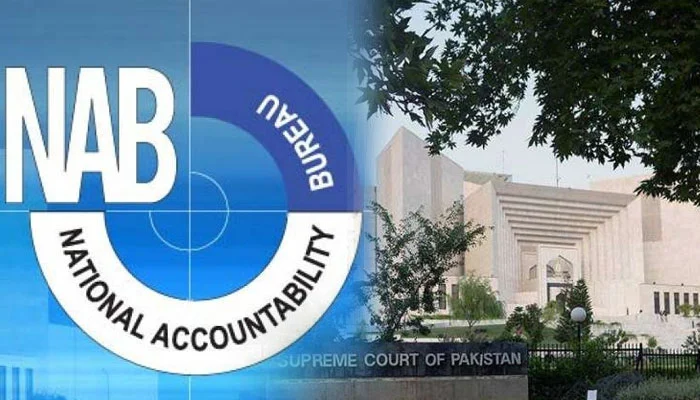Matters of superior court judges could be referred to NAB if they have ‘criminal overtones’ or an ‘element of corruption’: Irfan Qadir
Says it appeared that the judicial system was being ‘manipulated by certain people on the outside’
ISLAMABAD ( Web News )
Special Assistant to the Prime Minister on Accountability, Irfan Qadir Advocate, said on Thursday that matters of superior court judges could be referred to the National Accountability Bureau (NAB) if they have “criminal overtones” or an “element of corruption”.
“The National Accountability Ordinance has the jurisdiction and NAB can be referred to … there is no sacred cow for this law,” Irfan Qadir said in a news conference in Islamabad.
Ifran Qadir’s remarks come at a time when Parliament has passed a law to curtail the suo motu powers of the chief justice through the Supreme Court (Practice and Procedure) Act, 2023.
“There is only one category,” Irfan Qadir said. “And that is our superior court judges for whom confusion was created [with regard to laws].”
He added: “It was said that their matters were to be referred to the Supreme Judicial Council (SJC). Today I want to clarify that, yes, [judges’] matters do go to the SJC. However, where there are elements of corruption that attract criminality — that require criminal proceedings — it is there that they can be tried under this [accountability] law.”
Irfan Qadir said that in the past several years, even as prime ministers were disqualified and their governments were lost, “our Supreme Court ordered that their cases should be referred to NAB, who should investigate them and file references [against the PMs]”.
“Superior court judges’ matters will definitely be referred to the SJC, and if there are criminal overtones and an element of corruption … NAB has jurisdiction and they can look into it. There is no sacred cow [for] this law.”
The former attorney-general also spoke about audios that circulated on social media in February, allegedly linked to a sitting Supreme Court judge. The leaked audios were claimed to contain conversations between the judge and prominent politicians as well as specific lawyers. On May 20, the government formed a three-judge commission under Justice Qazi Faez Isa to investigate the veracity of the clips. Within days, a five-judge bench of the apex court halted the panel’s proceedings.
Irfan Qadir added that it appeared that the judicial system was being “manipulated by certain people on the outside” and that “there were indications of an element of corruption”.
Considering these matters, he said, the government exercised “extreme caution” to form the commission comprising fellow judges to investigate the matter.
“This was a fair opportunity provided to the judges to prove their innocence. If the commission’s report had come out favourable then the matter would not have been referred to the supreme judicial council or the anti-corruption institutions,” Irfan Qadir said. He added that it was unfortunate that the SC itself ordered a stay on this order.
He stated that the Supreme Court (Practice and Procedure) Act, 2023, empowered the SC and protected the chief judge from allegations but instead, the courts formed a bench against the act and stopped it from being instated.
“The government and the parliamentarians tried their best to protect the apex courts from the allegations against the chief,” he stated.
“No one has the fundamental right where they can stop law-making before it is implemented,” Irfan Qadir added while referring to the SC’s stay orders against the act.

